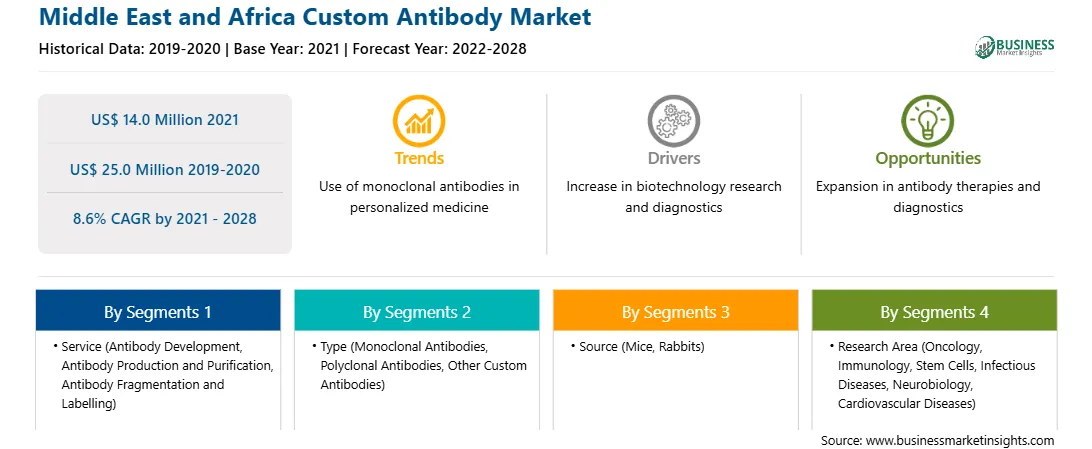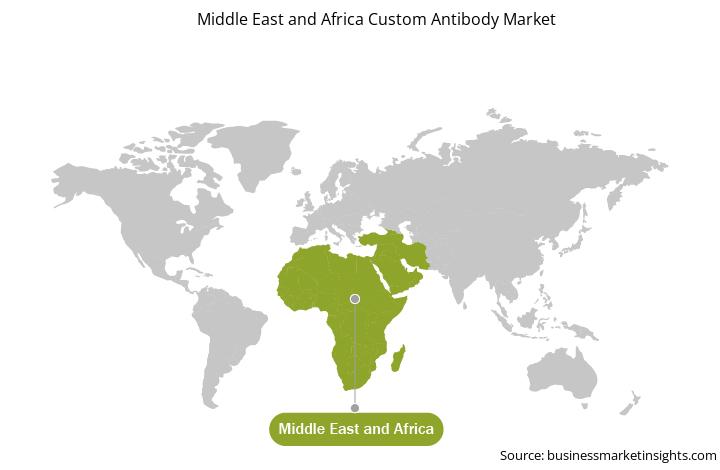Customized antibodies can be generated in a mouse, rat, or hamster, to meet any host requirements. Companies are providing a wide range of antibodies according to the researcher's requirements. There are various customized antibodies in the market, including polyclonal and monoclonal antibodies, recombinant monoclonal antibodies, hybridoma antibodies, polyclonal recombinant antibodies, etc. In addition, companies offer complete support services for all types and steps of antibody production from peptide design, synthesis, and carrier protein conjugation to animal immunization, serum collection, or hybridoma fusion, titre analysis, and final antibody purification.
Thus, the high demand in research is expected to create a significant demand for custom antibody in the coming years, which is further anticipated to drive the custom antibody market.
The pandemic has affected the research and development activities in these countries. Apart from this, a considerable population already faces a growing burden of non-communicable diseases, making them more vulnerable to the virus. Moreover, economic uncertainties and ongoing conflicts are worsening the condition in the region. For instance, countries such as Syria, Libya, and Yemen are suffering violent conflict and have been unable to implement any public health measures. In addition, Iran was in a deep economic recession due to the US sanctions. These factors are expected to impact the growth of the market in the region negatively. In addition, the primary source of economic stabilization in Middle East countries is oil production and export. However, the current pandemic is creating turbulence in the economics of the Middle East region. An immediate drop in domestic and external demand for goods and products, primarily crude oil, and halted production due to labor deficiency are significant impacts observed in the region. Additionally, tightened financial condition is also decreasing the overall economic activities in the area. This uncertainty with average delays often associated with regulatory approvals in low- and middle-income countries is hindering the market's growth.

Strategic insights for the Middle East and Africa Custom Antibody provides data-driven analysis of the industry landscape, including current trends, key players, and regional nuances. These insights offer actionable recommendations, enabling readers to differentiate themselves from competitors by identifying untapped segments or developing unique value propositions. Leveraging data analytics, these insights help industry players anticipate the market shifts, whether investors, manufacturers, or other stakeholders. A future-oriented perspective is essential, helping stakeholders anticipate market shifts and position themselves for long-term success in this dynamic region. Ultimately, effective strategic insights empower readers to make informed decisions that drive profitability and achieve their business objectives within the market.

| Report Attribute | Details |
|---|---|
| Market size in 2021 | US$ 14.0 Million |
| Market Size by 2028 | US$ 25.0 Million |
| Global CAGR (2021 - 2028) | 8.6% |
| Historical Data | 2019-2020 |
| Forecast period | 2022-2028 |
| Segments Covered |
By Service
|
| Regions and Countries Covered | Middle East and Africa
|
| Market leaders and key company profiles |
The geographic scope of the Middle East and Africa Custom Antibody refers to the specific areas in which a business operates and competes. Understanding local distinctions, such as diverse consumer preferences (e.g., demand for specific plug types or battery backup durations), varying economic conditions, and regulatory environments, is crucial for tailoring strategies to specific markets. Businesses can expand their reach by identifying underserved areas or adapting their offerings to meet local demands. A clear market focus allows for more effective resource allocation, targeted marketing campaigns, and better positioning against local competitors, ultimately driving growth in those targeted areas.

The Custom antibody market in Middle East and Africa is expected to grow from US$ 14.0 million in 2021 to US$ 25.0 million by 2028; it is estimated to grow at a CAGR of 8.6% from 2021 to 2028. Advancements in medical technologies provide support for the faster and highly efficient discoveries for antibodies that can be customized as per the customers’ requirements. Integrating bioinformatics in the discovery of antibodies has triggered improvements in custom antibody research. Therefore, artificial intelligence (AI) is likely to emerge as an essential, value addition tool for the discovery of custom antibodies. Oncology research is an emerging field for the application of custom monoclonal antibodies. Most of the clinical trials are performed using monoclonal antibodies derived from rabbits. For instance, anti-VEGF, a humanized anti-vascular growth endothelial factor (rabbit mAb) is currently under clinical studies for the evaluation of its effects on metastatic colorectal cancer and other solid tumors. Likewise, anti-VEGF is under clinical studies for its use in treating age-related macular degeneration. Monoclonal antibodies of derived from rabbits are proven as a superior alternative to mouse-derived monoclonal antibodies due to the presence of a larger complementarity determining region (CDR) in the antigen-binding site. In addition, monoclonal antibodies have capabilities to produce higher affinity clones. Various other sources are being evaluated for custom antibodies discoveries. Therefore, these discoveries are likely to enhance the growth of the custom antibody market during the forecast period.
In terms of service, the antibody development segment accounted for the largest share of the Middle East and Africa custom antibody market in 2020. In terms of type, the monoclonal antibodies segment accounted for the largest share of the Middle East and Africa custom antibody market in 2020. In terms of source, the mice segment accounted for the largest share of the Middle East and Africa custom antibody market in 2020. In terms of research area, the oncology segment held a larger market share of the custom antibody market in 2020. In terms of end user, the pharmaceutical and biotechnology companies segment held a larger market share of the custom antibody market in 2020.
A few major primary and secondary sources referred to for preparing this report on the custom antibody market in Middle East and Africa are company websites, annual reports, financial reports, national government documents, and statistical database, among others. Major companies listed in the report are Thermo Fisher Scientific Inc., Bio-Rad Laboratories Inc., Merck KGAA, Abcam, Genscript, and Agilent Technologies, Inc.
By Service
By Type
By Source
By Research Area
By End User
By Country
The Middle East and Africa Custom Antibody Market is valued at US$ 14.0 Million in 2021, it is projected to reach US$ 25.0 Million by 2028.
As per our report Middle East and Africa Custom Antibody Market, the market size is valued at US$ 14.0 Million in 2021, projecting it to reach US$ 25.0 Million by 2028. This translates to a CAGR of approximately 8.6% during the forecast period.
The Middle East and Africa Custom Antibody Market report typically cover these key segments-
The historic period, base year, and forecast period can vary slightly depending on the specific market research report. However, for the Middle East and Africa Custom Antibody Market report:
The Middle East and Africa Custom Antibody Market is populated by several key players, each contributing to its growth and innovation. Some of the major players include:
The Middle East and Africa Custom Antibody Market report is valuable for diverse stakeholders, including:
Essentially, anyone involved in or considering involvement in the Middle East and Africa Custom Antibody Market value chain can benefit from the information contained in a comprehensive market report.